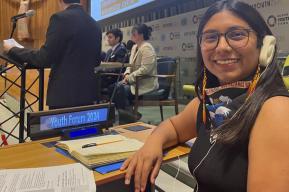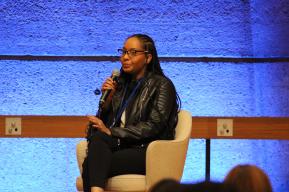
International Day of Women and Girls in Science
On 22 December 2015, the General Assembly decided to establish an annual International Day to recognize the critical role women and girls play in science and technology, through Resolution A/RES/70/212.
The International Day of Women and Girls in Science, celebrated on 11 February, is implemented by UNESCO and UN-Women, in collaboration institutions and civil society partners that aim to promote women and girls in science. This Day is an opportunity to promote full and equal access to and participation in science for women and girls. Gender equality is a global priority for UNESCO, and the support of young girls, their education and their full ability to make their ideas heard are levers for development and peace.
This year's celebration focuses on Closing the Gender Gap in Science: Accelerating Action, with an event on 9 February.

Tackling some of the greatest challenges of the Agenda for Sustainable Development - from improving health to combating climate change - will rely on harnessing all talent. That means getting more women working in these fields. Diversity in research expands the pool of talented researchers, bringing in fresh perspectives, talent and creativity. This Day is a reminder that women and girls play a critical role in science and technology communities and that their participation should be strengthened.

Facts & Figures

and only 35% of all students in STEM related fields of study are women

with data available on the national share of women researchers had reached parity in 2016


On this International Day of Women and Girls in Science, let’s reiterate this fundamental message: women need science, and science needs women. Only by tapping into all sources of knowledge, all sources of talent, can we unlock the full potential of science, and rise to the challenges of our time.


What UNESCO does for Women and Girls in Science

Global forum uniting women scientists from developing & developed worlds to strengthen their role

This programme seeks to recognise women researchers contributions in today's global challenges.

Too many girls and women are held back by biases and social norms influencing the quality of their education.

Gender inequalities in the water domain are deep and persist at all levels.

In support of academic freedom and gender-transformative approaches

To strengthen UNESCO’s work in support of gender equality in STI

Despite a shortage of skills in technological fields that are driving the Fourth Industrial Revolution, women still only account for 28% of engineering graduates and 40% of graduates in computer science and informatics, according to the forthcoming UNESCO Science Report whose chapter on gender in science, entitled To be Smart the Digital Revolution will Need to be Inclusive, shows women career scientists still face gender bias.
To be smart, the digital revolution will need to be inclusive, is part of the UNESCO Science Report: the Race against Time for Smarter Development. The full report tracks trends and developments in science governance worldwide every five years. The latest edition has a dual focus on the 2030 Sustainable Development Goals and on the Fourth Industrial Revolution.

Stories
Learn more
Publications
















